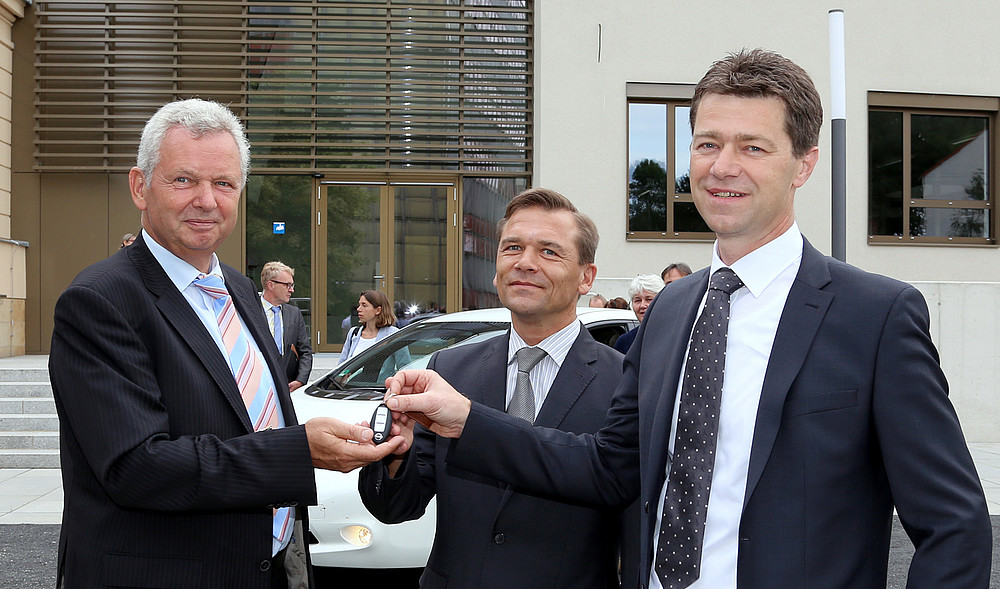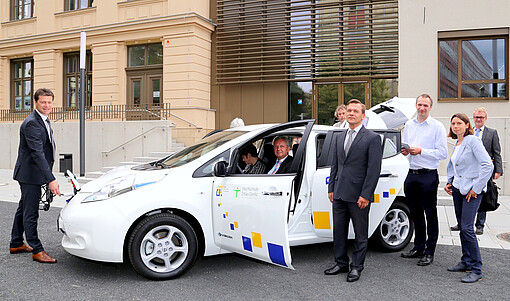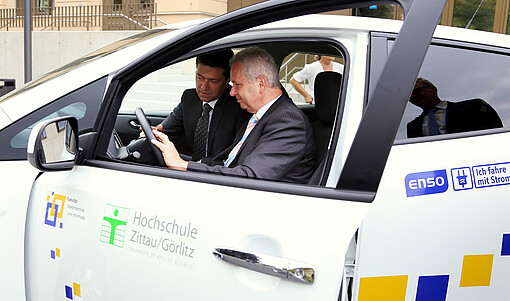On August 29, 2016, the Faculty of Electrical Engineering and Computer Science at Zittau/Görlitz University of Applied Sciences was ceremoniously presented with a fully electric Nissan Leaf 30 kWh vehicle for use by Gunnar Schneider, Group Head of Municipal Sales at ENSO.
"We will use the vehicle in particular for journeys between the two university sites in Zittau and Görlitz," said Professor Klaus-Dieter Haim, Dean of the Faculty of Electrical Engineering and Computer Science'.
This vehicle with a special direct current plug (Chademo) will also be used to investigate the possibility of feeding energy back into the power grid and what contribution such a vehicle can make as an emergency power supply for private homes.
In addition to reducing emissions in urban areas and reducing dependence on oil and gas, electromobility can also help to stabilize the electricity grid. If fewer and fewer conventional power plants maintain the balance between generation and consumption after the energy transition, consumers that can be switched on and off at short notice and electrical energy storage systems are an important prerequisite for stable grid operation.
In order to achieve all these goals, not only smart grids are required, but also a suitable communication structure between the grid and electromobility charging facilities as well as data collection and processing that is acceptable to the user.
Many questions about electromobility have not yet been fully answered: What contribution can electric cars make to support the grid? How many electric cars can a grid handle without and with expansion? What charging infrastructure is required and how can simple billing be achieved? How big is the potential (e.g. second cars or fleet vehicles)? What is the level of acceptance if the conditions of use change? And much more.
The faculty and ENSO are certain of one thing: electric vehicles are the future of mobility.
Technical data of the Nissan Leaf 30 KWH engine:
| Engine | Electric motor with 80 kW output and 254 Nm torque |
| Fuel consumption | approx. 15 kWh / 100 km (combined) |
| Battery capacity | 30 kWh |
| Charging time | Schuko (230 V AC / 10 A / 2.3 kW) 13 h (100%) Type 2 (230 V AC / 16 A / 3.6 kW) 7 to 9.5 h |
| Type | (400V AC / 16A / 6.6 kW) 5.5 h (100%) |
| DC | (Chademo) (50 kW) 30 min (80%) |
| Range | max. 250 km (according to NEFC) |
| Vmax | 144 km / h |
| Purchase price | from 34,385 euros (incl. battery) |
ENSO has procured the university's vehicle and other electric cars for municipal and regional partners through a funding program of the Federal Ministry of Transport and Digital Infrastructure (BMVI). These partners can gain experience with the vehicles for two years and act as ambassadors for electromobility in the region.
ENSO operates 15 charging stations in its supply area, two of which are in the district of Görlitz. Empty batteries can be recharged in Oybin and Neusalza-Spremberg. All charging stations are listed at www.stromticket.de/ladestationen .
By the way, the vehicle is also intended to advertise pioneering technologies and the many interesting study opportunities at the Zittau/Görlitz University of Applied Sciences.

Contact:
Zittau/Görlitz University of Applied Sciences
Faculty of Electrical Engineering and Computer Science'
Dean Prof. Dr.-Ing. Klaus-Dieter Haim
Phone: 03583 / 612 4309
E-mail: kdhaim(at)hszg.de
Zittau/Görlitz University of Applied Sciences
Hella Trillenberg
Advisor to the Rector/Press Officer
Phone: 03583/612 3030
E-mail: presse(at)hszg.de



